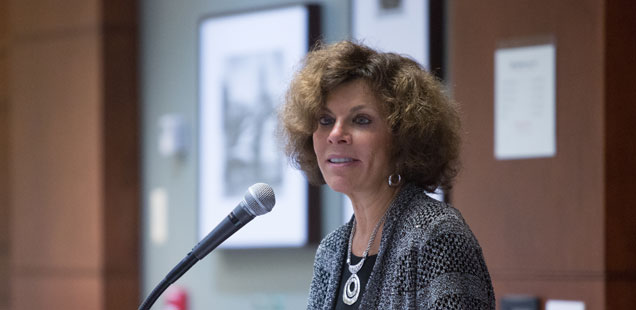2015 Richard S. Salant Lecture on Freedom of the Press
October 7, 2015 – Nadine Strossen, John Marshall Harlan II Professor of Law at New York Law School and former ACLU president, delivered the eighth annual Salant Lecture on Freedom of the Press, where she expressed her concerns that the over-regulation of sexual expression on college campuses is having a chilling effect on academic freedom.
Strossen opened her talk by briefly discussing how decisions made by the FCC in the wake of the 2004 Super Bowl halftime performance continue to impact broadcasting more than a decade later. The FCC severely punishes “so-called indecent expression which is constitutionally protected in all other media,” said Strossen. The threat of steep fines have prompted self-censorship of news; in 2006, CBS affiliates refused to air an award-winning documentary film about 9/11 because it contained profanity uttered by emergency responders, said Strossen.
Strossen then discussed how university sexual harassment policies increasingly go well beyond the Supreme Court’s definition of sexual harassment, “extending to speech with any sexual content that anyone finds offensive.” Strossen argued that this concept has become “entrenched” on university campuses as the Department of Education’s Office of Civil Rights (OCR) has threatened to pull federal funding from schools that do not “enact sexual misconduct policies that violate many civil liberties.”
“Combating gender discrimination, violence and sexual assault is of the utmost urgency,” said Strossen, “but OCR’s distorted concept of sexual harassment actually does more harm than good to gender justice, not to mention free speech.”
“OCR’s flawed sexual harassment concept reflects sexist stereotypes that are equally insulting to women and men. For women, it embodies the archaic infantilizing notion that we are inherently demeaned by any expression with sexual content,” she continued.
Strossen critiqued the current trend toward shielding students from ideas that may make them uncomfortable. “Last fall, Brown University set up a safe space for students who felt endangered by the mere fact that a debate was taking place on campus on the topic of how should campuses handle sexual assault,” she said, noting that the space was equipped with calming music, videos of puppies, and playdough.
“This focus on safety from disturbing ideas is especially misplaced given the ongoing serious threats to students’ physical safety, including rape and sexual assault,” said Strossen. “Also in the wake of the latest mass gun murders on a campus, we have to contrast government pressure to shield students from ideas with its failure to shield them from guns…when it comes to safety our students are being doubly disserved, too often denied safety from physical violence, which is critical for their education, but too often granted safety from ideas, which is antithetical to their education.”
As students themselves call for protection from ideas to which they object, Strossen paralleled the role of educators to that of the media, referencing a Richard Salant comment about the role of broadcast media: “Our job is to give people not what they want, but what we decide they ought to have.”
Strossen listed numerous examples of repression of academic freedom that have resulted from university sexual harassment policies, including: a sexual harassment investigation against a Northwestern University professor for writing an article that criticized such sexual harassment policies; a U.S. Naval War College professor who was placed on administrative leave for quoting a Machiavelli comment that included the mention of rape; and an Appalachian State University sociology professor who was suspended for showing a documentary that critically examined the adult film industry.
At Harvard, Strossen said, a chilling effect is also in place. She referenced an article by Janet Halley, Harvard Law School professor and feminist scholar, who wrote: “Classroom instruction, academic debate and normal everyday conversation…can and will become the basis of complaints and sanctions. Chill is already happening. Teachers at Harvard, alarmed by the policy’s expansive scope, are jettisoning teaching tools that make any reference to human sexuality.”
Strossen also discussed trigger warnings, hate speech, and the FCC in a question and answer session, which can be heard in the full audio recording below.
Read coverage of Strossen’s speech in The Atlantic: “How Sexual-Harassment Policies Are Diminishing Academic Freedom.”
Article by Nilagia McCoy of the Shorenstein Center. Photo by Martha Stewart.


